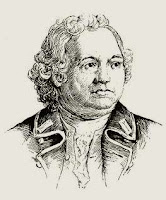“Major, that was worth you seeing”
 In the middle of his 24 Sept 1775 spy report to his handler inside Boston, Dr. Benjamin Church, Jr., offered this word picture of a scene in the Continental lines:
In the middle of his 24 Sept 1775 spy report to his handler inside Boston, Dr. Benjamin Church, Jr., offered this word picture of a scene in the Continental lines:
but of all seens that ever happen’d not long since our people got a famous New large Standard, Got upon the HillChurch’s report on this incident puzzles me, and not because of what it describes. The little mystery is why Church described the scene at all.
Doctor [Abiel] Leanard made amost Solem prayer over the Standard
Genll. [Israel] Putnam pulled of his hat, gave the Signal for three Chears which was given, Cleargeman and all of us huzzard at once, than the Indeans gave the war hoop and to conclud, of went Cannon, Major, that was worth you seeing.
This flag-raising took place on Prospect Hill on 18 July. Three days later the New-England Chronicle reported on it in detail:
Last Tuesday Morning, according to Orders issued the Day before, by Major-General Putnam, all the Continental Troops under his immediate Command assembled on Prospect-Hill, when the Declaration [of the Causes and Necessity of Taking Up Arms] of the Continental Congress was read, after which an animated and pathetic Address to the Army was made by the Rev. Mr. Leonard, Chaplain to General Putnam’s Regiment and succeeded by a pertinent Prayer; when General Putnam gave the Signal, and the whole Army shouted their loud Amen by three Cheers; immediately upon which a Cannon was fired from the Fort, and the Standard lately sent to General Putnam was exhibited flourishing in the Air, bearing on one Side this Motto, AN APPEAL TO HEAVEN--- and on the other side, QUI TRANSTULIT SUSTINET.The newspapers did not report the detail about Native Americans from Stockbridge shouting in their style, but Lt. Paul Lunt did confirm that detail in his diary: the ceremony ended with “a war whoop by the Indians.”
The whole was conducted with the utmost Decency, good Order, and Regularity, and to the universal Acceptance of all present.----And the Philistines on Bunker’s Hill heard the Shout of the Israelites, and being very fearful, paraded themselves in Battle Array.
So did Church’s retelling of this flag-raising have any intelligence value?
- This was a public event, already described in newspapers.
- It occurred more than two months before Church wrote. The British army knew about it immediately if they responded with a parade of their own.
- The letter’s description offers no useful military information, not even a description of the “New large Standard” in case British officers might want to recognize it.
Later in the letter Church wrote:
The last Week you killed one Man Wounded another, so that he lost his Leg and broke another Man thigh on Plowed hill.That was more recent news. In his History of the Siege of Boston, Richard Frothingham wrote:
The British paid special attention to the new works at Ploughed Hill. . . . on the 20th and 21st, after a furious cannonade of shot and shells at the works, and at a fatigue party near them, they killed an ox and wounded two men.The British command might at least have been pleased to hear that some of their artillery fire caused damage.
TOMORROW: Suspicions about another spy.
